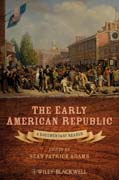
The first five decades of the United States of America was a particularly rich time in the development of American politics, society, and culture. This reader includes over 50 documentary sources that highlight key topics during thisperiod. The voices of familiar historical figures, such as George Washington and Tecumseh, are heard alongside the testimonies of ordinary people participating in the extraordinary events of their time. Sean Patrick Adams' introduction to each document provides the historical context to these documents and encourages students to engage with the material in critical and creative ways, making this reader a valuable text for students of the Early Republic. INDICE: Acknowledgements.Introduction.Chapter One: Building the United States:.A. Origins.1. First Inaugural Address of George Washington (1789).2. Tickagiska King Addresses President George Washington (1789).3. Western Pennsylvanians Petition Against Taxes (1790).B. The First American Party System.4. A Federalist Appeal to Voters (1792).5. Abigail Adams on the Partisan Press (1797).6. Matthew Lyon Criticizes Aristocratic Politics (1797).7. A Massachusetts Farmer Attacks the Federalists (1798).C. Recasting the American Nation.8. First Inaugural Address of Thomas Jefferson (1801).9. A New Name for the United States? (1803).10. Rules of Etiquette in Jeffersons White House (1803).Chapter Two:Clashes East and West:.A. Whose Land?.1. Lewis Great West (1805).2. Tecumseh Speaks Out Against American Policy in the Old Northwest (1810).3. An Artists Depiction of Scalping During the War of 1812 (1812).B. Conflict on Many Fronts.4. James Madison Justifies War with the British (1812).5. The Hartford Convention Denounces the War (1814).6. An Eyewitness Account of the Battle of New Orleans (1816).Chapter Three: The Postwar Nation Looks Forward:.A. 1819 in Image and Verse.1. A Poem About a Panic (1819).2. Americans on Their Way to a Camp Revival (1819).3. A Satirist Looks at the American Militia (1819).B.The Future Course of the Republic?.4. John C. Calhoun Promotes Federal Internal Improvements (1817).5. The American Colonization Society Appeals to Congress (1820).6. Maine Answers the Missouri Question (1820).Chapter Four: The Work of a New Republic:.A. A Nation on the Move.1. A Western Editor Endorses Old Hickory (1824).2. The Erie Canal Hits the American Stage (1830).3. An Englishwoman RemembersHer First Illinois Winter (1848).4. Charles Ball Describes Moving in the Slave Trade (1837).B. Work at Home, Field, and Factory.5. Lydia Maria Child on theFamily Economy and Soapmaking (1830).6. Two Views on the Morality of Capitalism in the Early Republic (1834 s Own Heart (1836).3. Zilpha Elaw Remembers Preaching in the North and South (1846).B. Improvement of Body and Soul.4. BostonPhysicians on Temperance (1832).5. Mathew Carey Advocates Reform for Seamstresses (1833).6. Sylvester Graham Denounces The Appetites (1837).C. Anti-Slaveryto Abolition.7. African-American Leaders Reject Colonization Schemes (1831).8. Declaration of Sentiments of the American Anti-Slavery Society (1833).9. Maria Stewart Speaks at the African Masonic Hall (1833).Chapter Six: Jackson's America:.A. The Rise of the Common Man.1. The Inauguration of Andrew Jackson (1829).2. David Walker Describes the Condition of Free African-Americans (1829).3. Angelina Grimké Defends the Rights of Women (1837).B. American Indians and the Common Man.4. Andrew Jackson Attempts to Justify Indian Removal to Congress(1830).5. John Ross Explains the Position of the Cherokee Nation (1834).6. A Description of Native American Removal in Tennessee (1835).C. The Second American Party System.7. A Violent Election Season in New York City (1834).8. HenryClay on Whig Strategy (1838).9. New Hampshire Papers Debate the Log Cabin Campaign (1840).Chapter Seven: The American Continent:.A. The Mississippi and Beyond.1. Narcissa Whitman Describes Missionary Life in Oregon (1836).2. George Catlin Describes the Mandan Buffalo Dance (1841).3. Notchiningas Map of the Upper Mississippi (1837).B. The Era of Manifest Destiny.4. Sam Houstons InauguralAddress for the Republic of Texas (1836).5. An Editor Endorses the Idea of Manifest Destiny (1845).6. Walter Colton on the Discovery of Gold in California (1850).C. War With Mexico.7. President Polks War Message (1846).8. An AmericanSergeants Perspective on the War with Mexico (1847).9. Guillermo Prieto Describes the Occupation of Mexico City (1850).Epilogue: The President and the Ex-Slave:.1. Zachary Taylors Inaugural Address (1849).2. Frederick Douglass on Morals and Men (1849)
- ISBN: 978-1-4051-6098-8
- Editorial: Blackwell
- Encuadernacion: Rústica
- Páginas: 240
- Fecha Publicación: 01/08/2008
- Nº Volúmenes: 1
- Idioma: Inglés
